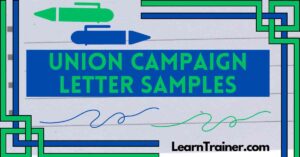Performance reviews can be nerve-wracking, right? We often dread having to sit down and discuss our contributions with our manager or team leader.
But here’s the thing: performance reviews are not just about your manager’s perspective on your work.
They’re an opportunity for you to showcase everything you’ve done over the past year. This means highlighting your achievements, skills, and the impact you’ve made on the team and organization.
You might be thinking, “What exactly qualifies as an accomplishment?” or “How do I express these in a way that stands out?” Don’t worry this blog is all about work accomplishment examples you can reference to shine in your next performance review.
I’ve compiled 12 real-world examples, provided step-by-step instructions for framing your accomplishments, and included common mistakes to avoid. By the end of this post, you’ll feel confident crafting your own standout accomplishments.
Demonstrating Leadership and Teamwork
One of the best ways to show your value in a performance review is through leadership and teamwork. Whether you’re in a leadership position or not, your ability to work with others effectively is a vital skill. Below are a few accomplishment examples that demonstrate this:
1. Leading a Successful Project
Example:
“I led a cross-functional team of 5 members to launch a new product line ahead of schedule. By keeping team members aligned with regular check-ins and clear task delegation, we were able to surpass our initial targets by 30%. As a result, the company achieved a 20% increase in revenue within the first quarter post-launch.”
Why it Works:
This accomplishment highlights your leadership skills while showing measurable results (increase in revenue). It also emphasizes teamwork and how you ensured everyone was on track.
Tip for Crafting Your Own:
Frame your leadership accomplishment around specific numbers (percentages, revenue, milestones) to make it tangible and impactful. Don’t just say “I led a project” – explain how your leadership made a difference.
2. Improving Team Communication
Example:
“I noticed a communication gap between departments, which was affecting project timelines. I initiated weekly inter-departmental meetings, which resulted in clearer communication, fewer errors, and a 15% reduction in project delays over the next six months.”
Why it Works:
By addressing a problem and providing a solution, this accomplishment shows problem-solving and leadership qualities. You’ve also quantified the impact (15% reduction), which makes the success more concrete.
Achieving Key Business Metrics
Another powerful way to highlight your accomplishments is by showcasing the results of your work in terms of key business metrics.
3. Boosting Sales Performance
Example:
“Through targeted marketing strategies and a revamped sales pitch, I increased sales by 40% in Q2. My initiative also helped retain 80% of our top clients, contributing directly to the company’s growth goals for the year.”
Why it Works:
Sales targets are clear and measurable. The focus on client retention and the specific percentage increase makes this achievement undeniable.
Tip for Crafting Your Own:
If you’re in a sales-related role, try to pull in conversion rates, sales numbers, and client retention stats to show your direct impact on company success.
4. Saving the Company Money
Example:
“I identified and eliminated several inefficiencies in the supply chain, resulting in a cost-saving of $50,000 annually. By negotiating with suppliers for better rates and reducing waste, I was able to improve the company’s profit margins.”
Why it Works:
Cost-saving is an accomplishment that speaks for itself. It’s measurable and demonstrates an impact on the company’s bottom line. Companies love when you can help save money!
Innovation and Problem Solving
Showing how you’ve tackled challenges or introduced innovative solutions is crucial. Employers value employees who can think outside the box and address challenges creatively.
5. Introducing New Technology
Example:
“I led the integration of a new CRM system that streamlined our client management process. This increased efficiency by 25%, reduced customer response times by 40%, and provided real-time data analytics that improved decision-making.”
Why it Works:
Adopting new technology shows that you’re forward-thinking and adaptable. Plus, the metrics tied to efficiency and customer satisfaction show your contributions’ direct impact.
Tip for Crafting Your Own:
If you’ve introduced or adopted new systems or tools, highlight their effectiveness in terms of time saved, client satisfaction, or improved data usage.
6. Solving a Major Customer Complaint
Example:
“After handling a major customer complaint that had been escalated multiple times, I resolved the issue in under 48 hours. My prompt response not only retained the client but also resulted in positive feedback, leading to a 20% increase in customer referrals from that account.”
Why it Works:
This accomplishment emphasizes problem-solving skills, customer service, and the ability to turn a negative situation into a positive one. Highlighting the impact on customer retention and referrals demonstrates long-term value.
Personal Development and Initiative
Not all accomplishments need to be company-driven. Personal growth and the initiative you show in developing your skills can also be very valuable.
7. Earning a New Certification
Example:
“I earned my Project Management Professional (PMP) certification, which allowed me to take on more responsibility in leading high-stakes projects. This certification helped me successfully manage a $1M project, delivered on time, and exceeded client expectations.”
Why it Works:
By showing your personal commitment to learning and improvement, you demonstrate a proactive mindset. Earning a certification directly contributes to your ability to perform at a higher level, adding value to your team and company.
8. Improving Time Management Skills
Example:
“I improved my time management skills by implementing the Pomodoro technique, which helped me reduce task completion times by 20%. As a result, I met all my project deadlines consistently and even managed to take on additional responsibilities.”
Why it Works:
Improvement in personal productivity not only increases your individual performance but also benefits the team. Employers love employees who optimize their workflow and consistently meet deadlines.
Going Above and Beyond
Sometimes, going above and beyond your role can leave a lasting impression. These examples show how you can highlight extraordinary contributions.
9. Volunteering for Company Initiatives
Example:
“I volunteered to organize our company’s annual charity event, which raised $15,000 for a local cause. My efforts helped enhance the company’s brand image while contributing to the community.”
Why it Works:
Volunteering for extra tasks demonstrates commitment to the company’s mission and willingness to contribute outside of your usual responsibilities. It’s a great way to show company loyalty.
10. Mentoring Junior Staff
Example:
“I mentored three junior team members, helping them improve their skills in data analysis and report creation. Two of them received promotions within six months due to the guidance I provided.”
Why it Works:
Mentoring others shows you’re a team player who adds value beyond your own tasks. It also demonstrates leadership in helping others grow within the company.
Recognition and Praise
Lastly, don’t forget the recognition you’ve received. Positive feedback from others is a strong indication of your impact.
11. Receiving Positive Feedback from Clients
Example:
“I received consistent positive feedback from clients regarding the quality of our service. One client specifically praised my attention to detail and responsiveness, stating that I was ‘the reason they chose us over competitors.’”
Why it Works:
When a client acknowledges your hard work, it speaks volumes about your impact on customer satisfaction. This kind of praise boosts your credibility and adds weight to your review.
12. Being Recognized for Meeting Targets
Example:
“I was awarded ‘Employee of the Month’ for consistently exceeding sales targets for three consecutive months. This recognition highlighted my dedication and ability to consistently meet goals.”
Why it Works:
Recognition from your company or clients speaks directly to your value. Being awarded for meeting or exceeding targets is a strong indicator of your effectiveness.
Common Mistakes to Avoid
When writing your performance review accomplishments, it’s important to avoid these mistakes:
- Vagueness: Be specific. Instead of saying “I worked well with the team,” provide numbers or specific examples of what you achieved together.
- Overloading with Jargon: Keep your language clear and accessible. Don’t get bogged down with technical terms unless they’re necessary.
- Not Taking Ownership: Don’t shy away from taking credit for your work. Use “I” to claim responsibility for your accomplishments.
- Lack of Quantification: Without numbers, your accomplishments may seem abstract. Always try to quantify results with percentages, numbers, or other measurable outcomes.
Conclusion: Crafting Your Own Accomplishments
Your performance review is your time to shine and show the full scope of your hard work. By following these examples and tips, you can create a well-rounded picture of your contributions. Remember, specificity is key highlight clear outcomes, demonstrate personal growth, and don’t forget to take credit for your accomplishments!
Now that you have 12 solid examples, it’s your turn. Use them as inspiration and get ready to write your own stellar accomplishments for your next performance review.
Did you find these examples helpful? Let me know what accomplishments you’ll be highlighting in your performance review, or share your own experiences in the comments below!
FAQs
Q: How do I make my work accomplishments sound impressive without bragging?
A: Focus on the impact your work had on the team or company rather than just yourself. Use quantifiable results (e.g., percentages, revenue) to make your achievements more tangible.
Q: Should I include personal accomplishments or focus only on work-related ones?
A: It’s best to focus on work-related accomplishments, but personal growth and certifications can also be important if they directly relate to your job performance.
Q: How do I handle a performance review when I feel like I haven’t achieved much?
A: Even if you don’t feel like you’ve achieved much, focus on areas where you’ve improved or made contributions, no matter how small. Think about how you’ve learned and grown in your role.


